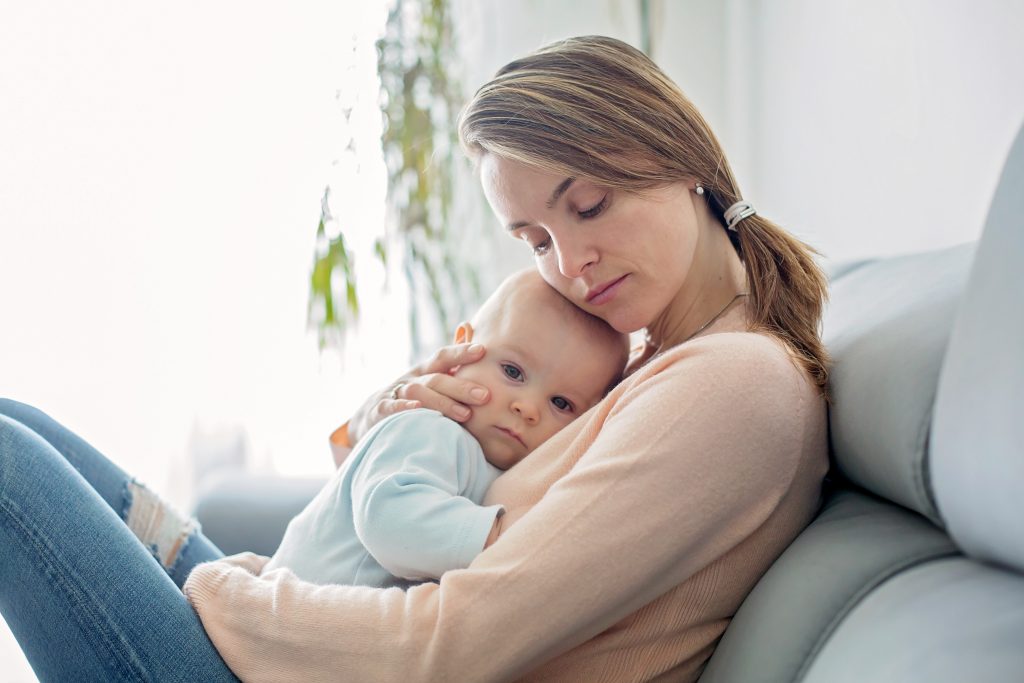Protecting Baby Through Their First Cold Season

As the weather starts to get colder, and the world around you starts to get the sniffles, you might start to worry (more than normal) about keeping your baby healthy during the inevitable cold season.
According to doctors, babies will get sick anywhere from 7 to 8 times in their first year. That’s a lot of colds. It’s good to know that it’s completely normal for your little one to get sick, but what if you want to cut down the number of times your little ones get sick as much as possible?
Thankfully there are lots of steps you can take to try to keep your baby cold-free. So, start taking germ-fighting seriously and follow these tips to avoid a cold, or at least make it more manageable when it does hit.
Practice extreme caution for the first two months
Your baby will receive their first round of immunizations when they are two months old. Before they do, it is extra important to keep your germ defenses up. The best thing to do during this time is to keep your baby away from large crowds. So, no shopping mall or grocery stores for the first two months.
Keep your baby close to you
Eventually, you are going to have to leave the house, and your baby is going to come with you. Try keeping your baby in a carrier if you can, strangers will be less likely to try to touch your baby if you are wearing them. Also, keep a wide breadth between you and anyone is sneezing or coughing.
Ask sick well-wishers to stay home
In the thick of cold season, your family and friends are likely to fall ill at some point themselves. When this happens, the Mayo Clinic recommends asking them to postpone any visits they had planned. Reschedule for a later date when they have been symptom-free for at least 24 hours. Also, make sure that little kids are allowed to see your baby, but not touch! We all know that small kids are basically germ factories, so it is best to err on the side of caution.
Wash your hands
It seems like common sense, like a complete no-brainer, but it is an important step in keeping you and your family healthy. Hands are basically germ highways, so be sure to scrub with soap for about 20 seconds after using the bathroom, coming in from a public place, eating, or changing a diaper. Also, make sure anyone visiting washes their hands before picking up your baby—their hands will have germs on them too!
Use hand sanitizer
You aren’t always going to have access to a sink and soap, so be sure to carry alcohol-based hand sanitizer in your diaper bag, your purse and in the car. While soap and water is the best way to properly wash your hands, hand sanitizer is a great on-the-go alternative to washing your hands.
Keep yourself healthy
When you become a new mom, your priority list shifts and you often slip to the bottom of the list. But when it comes to cold season, your health can have a direct impact on your baby’s health. Try to get enough sleep, even if you need to nap during the day. Make sure you are eating healthy and keep up-to-date on your vaccines.
Stay safe at the pediatrician’s office
If you are heading into your pediatrician’s office for shots or checkups, keep in mind that a lot of the kids there may be fighting off a cold or another illness. Try to get into the office for the first appointment of the day or ask to be put in an exam room right away to avoid a crowd of coughing kids.
Know the symptoms
Babies are going to get sick at some point. No matter how much you prepare and protect your little one, it will happen. Knowing the signs of the common cold can help you be prepared when it comes along.
Thankfully, a cold in a baby looks a lot like a cold in an adult. Keep an eye out for a runny nose, cough, sneezing, congestion, and a fever. Your baby may also have a harder time sleeping and eating, so add that to your list of symptoms to monitor.
Be prepared to fight the cold when it comes
Being prepared to help your baby fight their cold is important to help make their recovery quick and painless. Make sure your baby gets a lot of sleep, and keeps up their fluid intake. Thankfully, there are a few things you can keep in your first aid arsenal that can help you nurse your little one back to health.
Advil Pediatric Drops: One of the main symptoms of a cold is fever, so having a doctor recommended fever reducer that can give your baby up to 8 hours of fever relief is ideal. If your child is over 4 months, ask your doctor about giving them Advil Pediatric Drops to help relieve the fever and pain associated with a cold.
A humidifier: Keep the air in your baby’s room moist by running a cold-steam humidifier. The moist air that the humidifier creates helps to thin out nasal secretions. This will help to keep your baby’s nasal passages clear, making it easier for them to breath and sleep.
A bulb syringe or another nasal aspirator: Baby’s aren’t able to blow their own noses, so the task of keeping their nasal passages clear will fall to you. Using the bulb syringe is easy as 1-2-3-4. Create a vacuum by squeezing the air out of the bulb. Gently insert the rubber tip into one nostril. Slowly release the bulb and suction out mucus. Remove the syringe from your baby’s nose and forcefully squeeze the bulb into a tissue. Repeat on the other nostril.
This post was written in partnership with Children’s Advil, but the opinions are our own. Be sure this product is right for you, read and follow the label.
This information is provided for informational purposes only and is not intended as a substitute of any kind for professional medical advice, diagnosis or treatment of a qualified professional as required. Speak to your healthcare professional before making any changes to your lifestyle, or beginning or discontinuing any course of treatment. Never disregard professional medical advice or delay in seeking it because of something you have read on this site.












